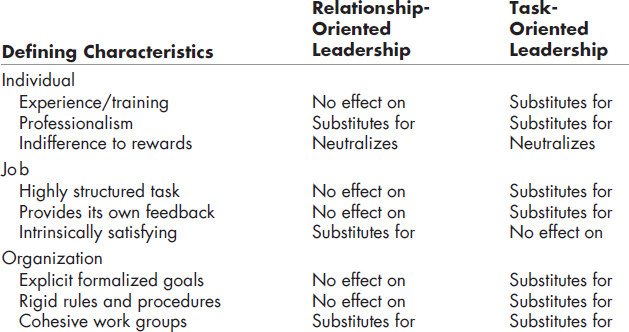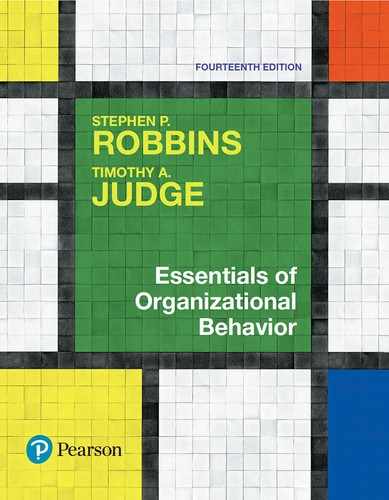Challenges to our Understanding of Leadership
Management expert Jim Collins said, “In the 1500s, people ascribed all events they didn’t understand to God. Why did the crops fail? God. Why did someone die? God. Now our all-purpose explanation is leadership.” This may be an astute observation from management consulting, but of course much of an organization’s success or failure is due to factors outside the influence of leadership. Sometimes it’s a matter of being in the right or wrong place at a given time. In this section, we present challenges to the accepted beliefs about the value of leadership.
Leadership as an Attribution
As you may remember from Chapter 6, attribution theory examines how people try to make sense of cause-and-effect relationships. The attribution theory of leadership says leadership is merely an attribution people make about other individuals.99 We attribute the following to leaders: intelligence, outgoing personality, strong verbal skills, aggressiveness, understanding, and industriousness.100 At the organizational level, we tend, rightly or wrongly, to see leaders as responsible for both extremely negative and extremely positive performance.101
![]() Perceptions of leaders by their followers strongly affect leaders’ ability to be effective. First, one study of 128 major U.S. corporations found that whereas perceptions of CEO charisma did not lead to objectively better company performance, company performance did lead to perceptions of charisma.102 Second, perceptions of leaders’ behaviors are significant predictors of whether employees blame their leaders for failure, regardless of how the leaders assess themselves.103 Third, a study of more than 3,000 employees from western Europe, the United States, and the Middle East found that people who tended to “romanticize” leadership in general were more likely to believe their own leaders were transformational.104
Perceptions of leaders by their followers strongly affect leaders’ ability to be effective. First, one study of 128 major U.S. corporations found that whereas perceptions of CEO charisma did not lead to objectively better company performance, company performance did lead to perceptions of charisma.102 Second, perceptions of leaders’ behaviors are significant predictors of whether employees blame their leaders for failure, regardless of how the leaders assess themselves.103 Third, a study of more than 3,000 employees from western Europe, the United States, and the Middle East found that people who tended to “romanticize” leadership in general were more likely to believe their own leaders were transformational.104
Attribution theory suggests what’s important is projecting the appearance of being a leader rather than focusing on actual accomplishments. Leader-wannabes who can shape the perception that they’re smart, personable, verbally adept, aggressive, hardworking, and consistent in their style can increase the probability their bosses, colleagues, and employees will view them as effective leaders.
Substitutes for and Neutralizers of Leadership
One theory of leadership suggests that in many situations, leaders’ actions are irrelevant.105 Experience and training are among the substitutes that can replace the need for a leader’s support or ability to create structure. Organizations such as video game producer Valve Corporation, Gore-Tex maker W. L. Gore, and collaboration-software firm GitHub have experimented with eliminating leaders and management. Governance in the “bossless” work environment is achieved through accountability to coworkers, who determine team composition and sometimes even pay.106 Organizational characteristics such as explicit formalized goals, rigid rules and procedures, and cohesive workgroups can replace formal leadership, while indifference to organizational rewards can neutralize its effects. Neutralizers make it impossible for leader behavior to make any difference to follower outcomes (see Exhibit 12-7).

Exhibit 12-7
Substitutes for and Neutralizers of Leadership
Source: Based on S. Kerr and J. M. Jermier, “Substitutes for Leadership: Their Meaning and Measurement,” Organizational Behavior and Human Performance (1978), p. 378.”
Sometimes the difference between substitutes and neutralizers is fuzzy. If I’m working on a task that’s intrinsically enjoyable, theory predicts leadership will be less important because the task provides motivation. But does that mean intrinsically enjoyable tasks neutralize leadership effects, or substitute for them, or both? Another problem is that while substitutes for leadership (such as employee characteristics and the nature of the task) matter to performance, that doesn’t necessarily mean leadership is irrelevant.107 It’s simplistic to think employees are guided to goal accomplishments solely by the actions of their leaders. We’ve introduced a number of variables—such as attitudes, personality, ability, and group norms; that affect employee performance and satisfaction. Leadership is simply another independent variable in our overall OB model.
Online Leadership
How do you lead people who are physically separated from you when you primarily communicate electronically? This question needs attention from OB researchers.108 Today’s managers and employees are increasingly linked by networks rather than geographic proximity.
We propose that online leaders have to think carefully about what actions they want their digital messages to initiate. These leaders confront unique challenges, the greatest of which appears to be developing and maintaining trust. Identification-based trust, based on a mutual understanding of each other’s intentions and appreciation of the other’s wants and desires, is particularly difficult to achieve without face-to-face interaction.109 Online negotiations can also be hindered because parties tend to express lower levels of trust.110
We believe good leadership skills will soon include the ability to communicate support, trust, and inspiration through electronic communication and to accurately read emotions in others’ messages. In electronic communication, writing skills are likely to become an extension of interpersonal skills in ways that are not yet defined.
